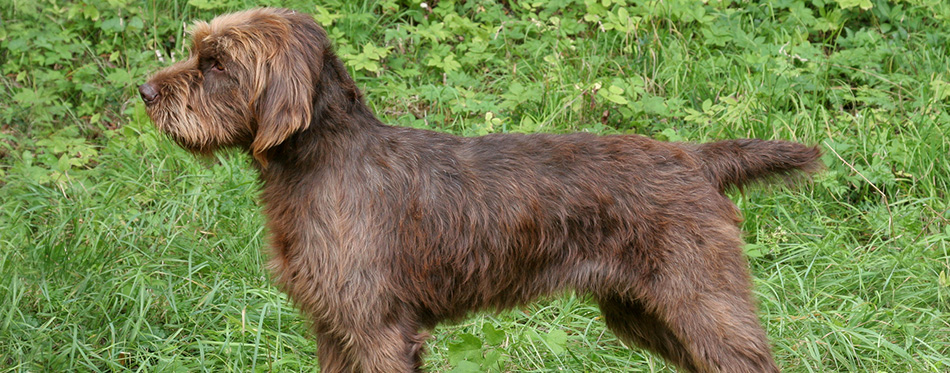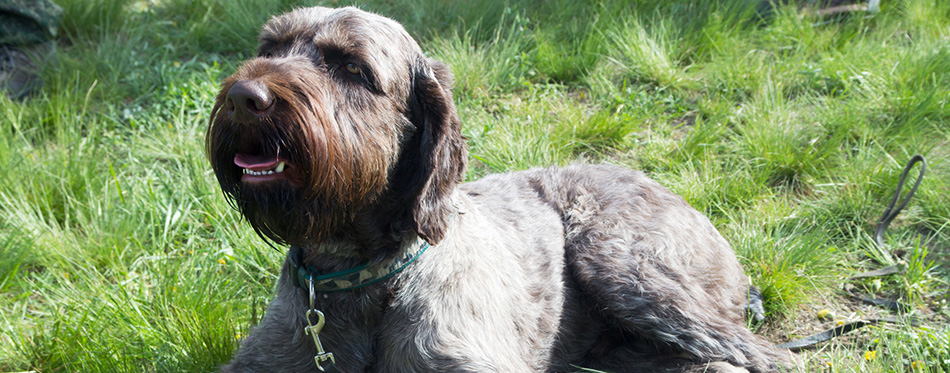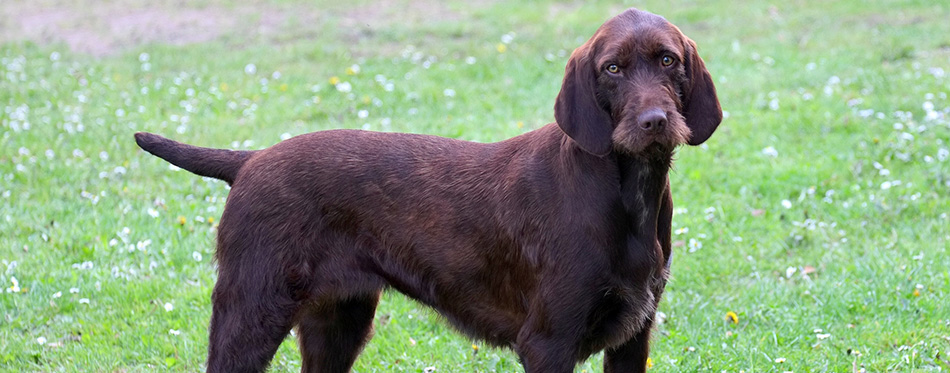The Pudelpointer is one of the world’s best all-around gun dogs, known for its versatility, intelligence, and biddable nature. While this breed is a hunter’s venerable partner out in the field, the Poodle Pointer can also be a family’s trusted and loving companion. It has the Poodle’s clownish behavior and Einstein-like wits. It also has the English Pointer’s fun-loving and competitive spirit. It is the perfect combination, tested and proven through the decades.
History of the Pudelpointer
Hunters expect their dogs to perform a number of tasks whenever they are out in the field. They should be able to track game and point where the animal is for their hunting companion to take the shot. These dogs should also be able to retrieve the downed animal wherever it is on land or in the water. Such a kind of versatile hunting dog was rare in the 19th century. This prompted Baron von Zedlitz to create the very first Pudelpointer. The German breeder’s goal was to produce a gun dog that can track, point, and retrieve game.
From the different breeds of hunting dogs available at the time, two stood out as far as von Zedlitz was concerned. These were the English Pointer and the Poodle. The English Pointer is well-known for its tenacity when it comes to hunting. This is a breed that can hold its position without ever startling its prey. It has a loving nature and pleasant personality, too. It also has an excellent nose and a strong pointing instinct.
On the other hand, the Poodle is well-regarded for its ability to retrieve downed waterfowl. The Poodle hunting dog uses its waterproof coat and webbed paws to tread in the water. It also has a very biddable nature and is the world’s second most intelligent dog breed after the Border Collie. It loves retrieving and any water-related activities.
Von Zedlitz knew that these two canine breeds would be the perfect pair for his idea of a versatile hunting dog. Hence, he worked with about a hundred different English Pointers and 7 German hunting Pudels to perfect the hunting dog breed.
The first English Pointer to be used in von Zedlitz’s breeding program was Tell. This sire belonged to Kaiser Frederick III, the King of Prussia. Von Zedlitz mated Tell with Molly, a German hunting Pudel. Molly belonged to Hegewald, a hunting dog author.
Over the course of 3 decades, von Zedlitz persevered to perfect the breed. He used more Pointers than Pudels in his breeding program because of the stronger genetics of the German Pudel. This was necessary to help achieve the right balance of hunting dog instincts that von Zedlitz had envisioned for the Poodle Pointer. Von Zedlitz used a total of 80 English Pointers and 11 Pudels in one of history’s most extensive breeding programs.
Like all other dog breeds, the Poodle Pointer suffered a major setback during the First and Second World Wars. Their numbers started to decline, prompting breed fanciers to reestablish the breed right after WWII. They did this by reintroducing the English Pointer into the breed stock of the remaining Pudelpointers.

In 1956, Bodo Winterhelt began breeding the Poodle Pointer in Canada. He established the Winterhelle Kennel to help strengthen the breed foundation in North America. Born in Mainz, Germany, Winterhelt wanted to bring the Munsterlander because of the dog’s remarkable versatility in pointing, hunting, and retrieving. Instead, he opted for the Pudelpointer – Cati von Waldhof – after securing the consent of the German Pudelpointer Club.
Cati proved to be as capable as the Munsterlander. It excelled in North American field trials, while also earning the respect and admiration of other breeders. One of them was Douglas Hume. Together, Winterhelt and Hume worked to translate the Hunt Test from German to English. The Hunt Test evaluates the hunting dog’s natural abilities such as water skills, fielding, and tracking. Only dogs that pass the test are allowed for breeding. This is to help reinforce and strengthen the standards of the gun dog breed.
With the establishment of the All Purpose Gun Dog Association in 1960, there occurred a commensurate increase in the interest towards Pudelpointers. The new association laid the rules for recognizing “versatile” hunting dogs. In the first and only field competition of the organization, Winterhelt’s Komet bested 13 other versatile gun dogs. The dog won the accolade of gun dog owners and members of the press. Komet provided the framework for the creation of the standards for all versatile hunting dogs in North America. These are the very same standards that the North American Versatile Hunting Dog Association observes.
Winterhelt finally established the Pudelpointer Club of America in 1977. Breeders had to comply with the stringent Hunt Test if ever they want to start breeding Pudelpointer. Different hunting dog organizations provide the skills set that all hunting dogs must pass before they’re allowed for breeding. These included the Verein Pudelpointer, the Verein Pudelpointer Landesgruppe North America, the Pudelpointer Club of North America, and the North American Pudelpointer Breeders Alliance.
One has to take note that the Poodle Pointer is a working dog valued for its remarkable hunting abilities. Having it recognized by the American Kennel Club will mean that breeders will have to focus more on conforming to the physical attributes of the dog. However, the breed is already included in the AKC’s Foundation Stock Service.
The Pudelpointer does not have a strong following in the US. However, there are still American hunters who own these dogs because of their phenomenal hunting skills. The breed belongs to the Continental Pointing Dogs Group of the Federation Cynologique Internationale. The Canadian Kennel Club classifies it as a Sporting Dog, while the United Kennel club recognizes it as a Gun Dog.
Quick Facts about the Poodle Pointer
Pudelpointers are hunters, valued for their working abilities and not their physical characteristics. As such, picking a Pudelpointer can be quite challenging. There are very few physical characteristics to base your decisions on. However, this does not mean you cannot use the following facts in your search for the best Poodle Pointer for your hunting adventures.
- A Medium- to Large-Sized Hunter
The Pudelpointer combines the anthropometric characteristics of its foundation parents – the Poodle hunting dog and the English Pointer. This breed can stand some 22 to 27 inches for males and 20 to 26 inches for females. They can also weigh at least 44 lbs, but never beyond 66 lbs. Female Pudelpointers are lighter by one or two lbs than their male counterparts.
- They Love to Swim
This is a trait that the Pudelpointer, without a doubt, got from its Poodle parent. Poodles are excellent swimmers. They have webbed paws that allow them to swim with very minimal effort. This allows the dog to jump right into the water to retrieve downed game. It also has a waterproof coat that keeps it warm whenever it is in the water. The Poodle Pointer also has this uncanny attraction for water. Don’t be surprised if your Pudelpointer decides to jump into a river or a lake for a quick swim whenever you take it out for a stroll.
- An All-Around Hunter
Being a versatile hunter is a tough act to follow. That is why breeders have to be very selective in the dogs that they introduce into their programs. Also, every dog has to pass the Hunt Test before their owners can use them for breeding. This helps make sure that their offspring will also have the innate hunting abilities of the Pudelpointer. This is a dog that can track using its heightened sense of smell. Its precision in pointing where the game is at is phenomenal. It is exceptional in retrieving game, too. Whether you fancy upland game or water fowls, this is a hunter that can do it all.
- A Bearded-Hunter
One very unique physical feature of the Poodle Pointer is the appearance of a “beard”. It looks like a Schnauzer, a soft-coated Wheaten Terrier, or a Coton de Tulear. This is quite weird, considering neither the Poodle nor the English Pointer have a bearded face.
- Good News for Asthmatics
Another Poodle trait that is strong in the Poodle Pointer is its low shedding potential. This is good news for people who may suffer from pet dander allergies or asthma. One thing you have to keep in mind, however, is that the dog can still trigger an allergic response from overly-sensitive folks. In general, however, the Pudelpointer is a great hunting partner for folks with allergies.
- They Come in Different Color Variations
The focus of Pudelpointer breeders is in the strengthening of the dog’s working or hunting abilities. They do not care so much about the color or pattern of its coat. As long as the breed can perform and pass the Hunt Test, then it is a versatile hunting dog. Having said that, this dog can come in different colors. There are those with solid colors, displaying no additional markings. They can include black, chestnut, liver, and everything else in between.
- They are Affordable
Because the Pudelpointer is not AKC-listed, you can expect it to be less expensive than AKC-listed hunting dogs like Poodles and Retrievers. Breeders of AKC-listed hunting dogs can charge up to $4,000 for a Labrador Retriever puppy. On the other hand, you can get Pudelpointer puppies from a reputable breeder for as low as $800, although $1,000 is still fair.
Things You Should Know About Pudelpointer
Being a working dog means the Pudelpointer needs a different kind of care and attention from its respective owners.
Health
In general, Pudelpointers are a healthy breed. They can grow as old as 14 years. While it is true that there is no health problem that is specific to the breed, it is still vulnerable to the diseases that are common among dogs of its size.
Hip dysplasia is one concern that pet owners should be wary of. This can lead to arthritis and undermine the mobility of the dog. Allergies and eye problems are a constant threat to its health. Also, Pudelpointers are deep-chested, one of the risk factors of gastric torsion.
Training
Training a Pudelpointer is as easy as teaching a Poodle certain tricks. After all, it was able to retain this remarkable characteristic of its Poodle ancestor. Training should always begin the moment the dog arrives in the home.
Teach the puppy about certain rules in the house. Train it to obey basic commands. Once it masters these tricks, you can start including more advanced obedience training exercises. Plus, training the dog gives it something to do.
Keeping the dog occupied helps prevent many behavioral problems that people see in intelligent canines, all because their owners neglected to train them. Keep the training sessions interesting and short. This is a smart dog that “gets” most of what you are teaching the first time around.
Exercise
Being a versatile hunter means the Pudelpointer needs regular exercise to keep it happy and healthy. If you have a spacious yard, allowing the dog to run about can be a great form of exercise. Play hide-and-seek or a game of fetch. It would be a bonus if you live near a natural body of water. This is a breed that loves to swim.
One of the best forms of exercise for this breed is hiking. Make sure to take it outdoors as you explore the trails near your community. It can be a great hiking companion as it is a wonderful hunting partner.
Nutrition
Learn to compute for the dog’s calorie requirements by considering its size, age, activity level, and overall health. Very active dogs will need more calories than those with moderate-intensity physical activities. If you are not sure about the number of calories that your dog will need, it is best to consult your veterinarian.
As much as possible, give the dog only high-quality pet food. Their best nutrition comes in the form of raw whole-prey animals and raw vegetables and fruits. Given that this kind of nutrition can be tricky, your next best option will be to give the Pudelpointer premium-quality wet dog food. This type of food mimics the nutrient composition of whole prey raw food.
Since the dog is deep-chested and is at risk of bloat, one should feed it at least twice a day. Refrain from feeding the dog one large meal as this can increase the risk of gastric torsion.
For more guides on choosing the right dog food, you may wish to check out our reviews of the best dry dog food, organic dog food, grain free dog food, dehydrated dog food and puppy food.
Grooming
This dog does not shed that much which is great news for allergy sufferers. It still requires regular brushing at least once a week, however. Many of these dogs have a wiry coat that may require the attention of a professional groomer. Bathe the dog only when necessary so as not to strip its skin of its natural oils.
After every hunting adventure, it is also best to check its coat for any ticks, fleas, and other parasites that may have clung to its coat. Check its ears and paws as well. There might be burs and other debris that can get into these parts of its body.
Clipping its nails once every 3 to 4 weeks is mandatory. So is its dental care, which you can perform once every 3 to 4 days. Clean its ears every week and make sure to check it for any sign of inflammation.
For more help on dog grooming, you may wish to read our guides on the best dog nail grinders, dog dryers, dog clippers, dog paw washers and dog ear cleaners.

Temperament
True to its forebears, the Pudelpointer is a great combination of a working dog and a family companion. It is a loyal companion, both to its family and its hunter friend. It has a calm temperament, making it a great choice for families with children. The dog can play with kids and learn tricks to entertain its family, a trait that it got from its Poodle parent. It also has the natural curiosity and intelligence that can rival that of other Einstein-like canine breeds.
Pudelpointer puppies can be rambunctious, blending their natural curiosity with their playfulness. It loves the attention and affection that its family gives to it. It thrives well when the Pudelpointer is in the company of the people it adores. That is why this dog is also quite prone to separation anxiety. The kind of owner that the breed responds to best is one who is gentle and confident.
This versatile gun dog is also an excellent watchdog. Owing to its hunting abilities, it knows if an intruder is within its territory. It will bark, letting its owners know that something is amiss. This also means the Pudelpointer can be territorial. It is for this reason that the socialization of Pudelpointer puppies is crucial. You do not want them growing up to be shy, timid, or wary of strangers.
Pudelpointers are exceptional all-around hunters. They can be fun-loving family companions, too. It has the many fine qualities of its foundation parent breeds, while also displaying its own unique temperaments. This makes the Poodle Pointer a great pet for the active family of the modern times.
Source:
- Pudelpointer – AKC


